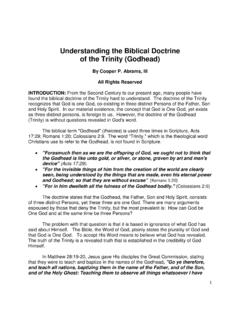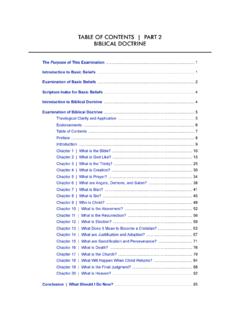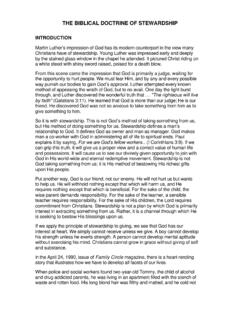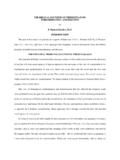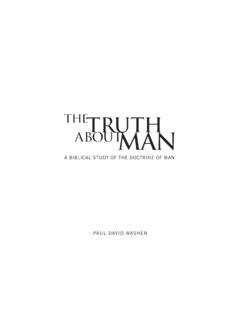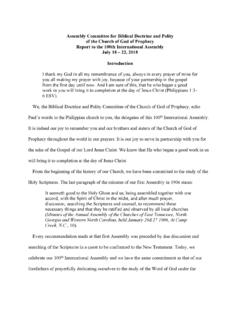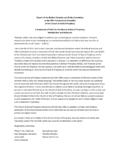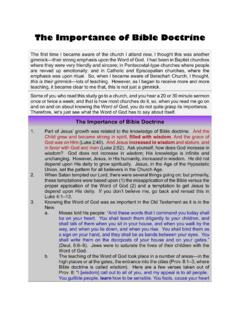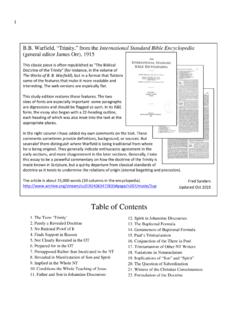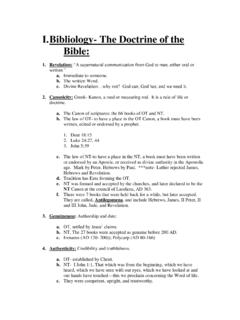Transcription of The Biblical Doctrine of Adoption - New Creation Library
1 New Creation Teaching Ministry Monthly Ministry Study: 28 October 2009 MMS82 1 The Biblical Doctrine of Adoption Rev. Dr. Noel Due, Coromandel Baptist Church 1. Adoption = to be brought into relationship with the Father, in a manner which bestows full rights of sonship and full paternal intimacy. a. This is a work of the Triune God. It is the Father who adopts; the Son in whom that Adoption takes place (by virtue of believers union with him); and the Spirit of the Father (poured out through the Son) who as the Spirit of Adoption , brings us into relationship with the Father in the Son and teaches us to cry Abba . b. This work is also a redemptional work in that i. we were enslaved to another father by virtue of our sin and guilt, and thus needed to be redeemed; and ii. our relationship with the Father could not be established by mere fiat, since Adoption that does not deal with human sinfulness would be impossible to God, the holy Father.
2 We could not be his sons truly, if our sin and guilt were not destroyed, as we could never be conformed to the image of the Son, which is the Father s purpose for his adopted children. c. Adoption , therefore, is not possible only by dint of Incarnation alone. There must be an actual rescue and change of relationship brought about by the work of the Cross if Adoption in any meaningful sense of the term is to be made possible. i. In this context it is worth noting Jesus words in John 8:35-36. The freedom which Jesus brings is the freedom of sonship, as opposed to the bondage of slavery. The sons of Abraham to whom Jesus was speaking assumed that his words referred to physical slavery, when in fact he spoke of spiritual slavery to a false father . This slavery is due in to the rejection of the grace and love of God, in favour of a legal relationship with God based on works of the law.
3 Paul s exposition of this is set out in Galatians 3:22-4:6, and it is also reflected in his personal testimony in such passages as Acts 26:4-18 cf. Philippians 3:1-11; Titus 3:3-7; etc. The spiritual enemies known as the Flesh and the Law work hand in glove to keep us in bondage, doing the bidding of the father of lies. ii. The Biblical Doctrine of redemption (which has slavery as its background) therefore forms an integral part of Jesus understanding of his mission. He has come to set free ( redeem) slaves by making them sons. In the Old Testament a redeeming party had to fulfil certain conditions they had to be a blood relative of the person in need of redemption; they had be a free person themselves; they needed to be willing to redeem; and they needed to have the wherewithal to meet the purchase price. Jesus fulfilled all of these elements, so he alone can bring the gift of true sonship to the world.
4 Iii. Redemption connotes the power under which a person is enslaved and from which they need to be freed, though in the Old Testament (in relation to Israel) God s adopted son by New Creation Teaching Ministry Monthly Ministry Study: 28 October 2009 MMS82 2 covenant is always God s property. He claims back what is his from the usurper powers such as Pharaoh. 1. In some instances, Paul closely attaches himself to the OT conception of the word. There is a well defined eschatological usage of the term redemption in his epistles, which has associated with it the thought that God will in the last day recover what is originally or in principle His own. Thus in Romans 8:23 the apostle speaks of the redemption of the body as an act of Adoption , , he recognizes in it the logical result of the relation of sonship in which the believer stands to in two passages of the epistle to the Ephesians do we find an exact reproduction of the Old Testament idea.
5 In 1:14 the Holy Spirit appears as the earnest of our inheritance, which earnest is given with a view to the redemption of God s own possession. And in 4:30 the readers are said to have been sealed in the Holy Spirit of God unto the day of redemption. The Holy Spirit marks them as God s property which he will reclaim at the end. G. Vos Redemptive History and Biblical Interpretation p 367. iv. Reconciliation is a term that points to the restoration of relationship by virtue of just judgement being enacted. Erstwhile sons need to be reconciled to the Father to receive the gift of Adoption . In reconciliation we encounter a complex of ideas such as expiation, propitiation and justification. However, the main thing to keep in mind is that this is God s work, and the work of the Son in relation to bearing of sin is that God s holiness would be satisfied ever before any human hearts find comfort from a warm and fuzzy Fatherhood.
6 2. The relationship into which we are adopted is congruent with our nature by Creation . a. The whole of humanity was created in God s image and was to participate in the intimate, full and tender relationship that being children of the Father implied, as well as receiving the full rights embodied in the status of sons of God (without reference to gender!). i. Sonship and image bearing go together, not simply in Genesis 1:26ff. and 5:1-3, but clearly in the New Testament teaching on our final telos as God s image bearers ( Rom. 8:29; 1 Cor. 15:49; Eph. 1:3-14; Phil. 3:21; 1 John 3:2; etc.). We are made sons of God at the eschaton, but revealed and perfected in that which we already have (Col. 3:1-4 cf. 1 John 3:2a; Rom. 8:14ff.) ii. In a very real sense we cannot understand the glory of our sonship merely by inferring it from the Creation accounts.
7 As with many aspects of the Christian faith, we must read from the telos backwards, but even this is only possible because of the coming of the Son into our midst. b. Adam was the son of God (Luke 3:38). There is a sense in which we need to affirm that God is the Father of all men and women (Acts 17:28-29). However, not all men and women are sons of God in the sense of redemption/ Adoption , which is known only by grace through faith (Gal. 3:6, 26 cf. Rom. 9:7-8; John 8:31-59). New Creation Teaching Ministry Monthly Ministry Study: 28 October 2009 MMS82 3 i. God, as the loving Father of all men and women, provides for our needs and tends us with loving care ( Psalm 104; Matt. 5:44-48; Luke 12:13-34; Acts 14:17; 17:24-25). He gives freely, begrudging nothing, and through the Son upholds all things that he has made (Heb. 1:1-4).
8 Ii. However, he has sent his Son into the world to gather his family (John 11:52 cf. Eph. 1:5; Rom. 8:29-30), and this gathering is spoken of in terms of elective grace. iii. The family thus gathered does not belong to the world. Indeed it is rejected by the world (in the theological sense of the term) on account of the Father whose family believers are (1 John 3:1 cf. Jn. 15:18-23; 16:3; etc.). This is because the world belongs to a different father ( 1 John 3:12 cf. John 8:44). c. Jesus identity as fully and truly human emphasises the fact that we have been created to know the Father. Jesus knowledge of the Father, as a man may know the Father, is not predicated on his Deity. Sonship is, properly speaking, the pinnacle of human nature and the full expression of the image of God with which we have been endowed. i. Jesus, as the Son of the Father, is thus truly and fully what a human being was created to be!
9 Ii. Our sonship will be nothing other than full conformity with his! 3. The Biblical theology of covenant is adoptive in its action and intent. a. The act of God s entering into covenant relationship is elective and thus adoptive. The intention of that elective act is that God would be known as their God and the covenant partners would be his people . i. In Romans 9:4-5, therefore, we see the close connection between covenant and Adoption ; and these are closely connected to all other aspects of the privileges that belonged to Israel as God s covenant son. ii. This link between Adoption and covenant is seen elsewhere ( Ex. 4:22 cf. Hos. 11:1; Deut. 7:6) and it thus means that Israel, as God s adopted covenant son-people knew God as Covenant-Father ( Deut. 32:6; Is. 63:16; 64:8; Jer. 3:19; 31:9; Mal. 1:6; 2:10; etc.) b. Israel was a holy nation (in that they belonged to the Holy God, who had made them holy to himself) and a royal priesthood (in that they were the son-people of the Great King, and in this were the representatives of God to the nations, not least in their worship).
10 I. Exodus 19:5-6 indicates that the full blessing of this would be known to Israel only as they remained in covenant faithfulness. The history of their relationship with God is that they proved themselves faithless (Jer. 3:14, 22), but he remained faithful (Hos. 6:1f; 11:1ff.) , even to the point of sending the Son himself, first for the people of Israel (Matt. 10:5-6; 15:24 cf. Rom. 15:8) and then to gather the children of God scattered throughout the world (John 10:16; 11:52) c. We can thus understand that forging of a new covenant in the blood of the son is inseparably linked to the Father s desire to have his full family brought in. The new covenant passages in the Old Testament New Creation Teaching Ministry Monthly Ministry Study: 28 October 2009 MMS82 4 ( Jer. 31:31-34; 32:40; Ezk. 34:23; 36:22ff.; 37:22-26) all have forgiveness as their basis, and in their contexts all relate to the gathering in of the children of God.

